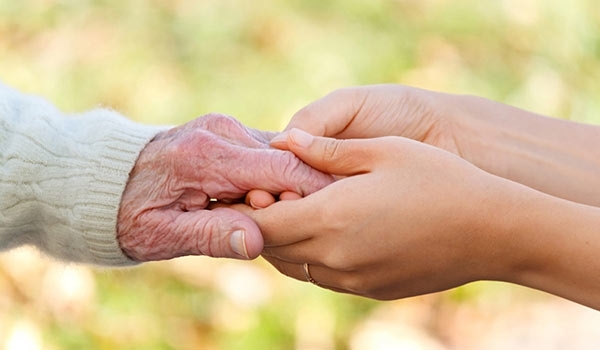11. Allah prolongs the life of someone who is dutiful towards his parents
22. Mu’adh said, “Bliss belongns to someone who is dutiful towards his parents. Allah Almighty will
prolong his life.”
12. One does not ask forgiveness for his father if he is an idolater
23. Ibn ‘Abbas mentioned the words of the Almighty, “When one or both of them reach old age with you, do not say ‘Ugh!’ to them out of irritation and do not be harsh with them but speak to them with gentleness and generosity. Take them under your wing, out of mercy, with due humility and say:’Lord, show mercy to them as they did in looking after me when I was small.” (17:23-24) He said:”This was abrogated in Surat at-Tawba: ‘It is not right for the Prophet and those who have iman to ask forgiveness for the mushrikun even if they are close relatives after it has become clear to them that they are the Companions of the Blazing Fire.’ (9:113)”
13. Dutifulness towards a parent who is an idolater
24. Sa’id ibn Abi Waqqas said: “Four ayats were revealed about me. The first was when my mother swore she would neither eat nor drink until I left Muhammad, may Allah bless him and grant him
peace. Allah Almighty revealed, ‘But if they try to make you associate something with Me about
which you have no knowledge, do not obey them. Keep company with them correctly and courteously
in this world (31:15) The second was when I took a sword that I admired and said, ‘Messenger of
Allah, give me this!’ Then the ayat was revealed: ‘They will ask you about booty.’ (8:1) The third was
when I was ill and the Messenger of Allah, may Allah bless him and grant him peace, came to me and
I said, ‘Messenger of Allah, I want to divide my property. Can I will away a half?’ He said, ‘No.’ ‘A
third?’ I asked. He was silent and so after that it was allowed to will away a third. The fourth was
when I had been drinking wine with some of the Ansar. One of them hit my nose with the jawbone of
a camel. I went to the Prophet, may Allah bless him and grant him peace, and Allah Almighty
revealed the prohibition of wine.”
25. Asma’ bint Abi Bakr said, “In the time of the Prophet, may Allah bless him and grant him peace,
my mother came to me hoping (I would be dutiful). I asked the Prophet, may Allah bless him and
grant him peace, ‘Do I have to treat her well?’ ‘Yes,’ he replied.”
Ibn ‘Uyayna said, “Then Allah revealed about her, ‘Allah does not forbid you from being good to those
who have not fought you in the deen.’ (60:8)”
26. Ibn ‘Umar said, “‘Umar saw a silk robe for sale. He said, ‘Messenger of Allah, would you buy this
robe and wear it on Jumu’a and when delegations visit you?’ He replied, ‘Only a person who has no
portion in the Next World could wear this.’ Then the Messenger of Allah, may Allah bless him and
grant him peace, was given some robes made of the same material. He sent one of the robes to ‘Umar.
‘Umar exclaimed, ‘How can I wear it when you said what you said about it?’ The Prophet replied, ‘I did
not give it to you so that you could wear it. You can sell it or give it to someone.’ ‘Umar sent it to a
brother of his in Makka who had not yet become Muslim.”
14. A person should not revile his parents
27. ‘Abdullah ibn ‘Amr said that the Prophet, may Allah bless him and grant him peace, said,“Reviling one’s parents is one of the great wrong actions.” They asked, “How could he revile them?”
He said, “He reviles a man who then in turn reviles his mother and father.”
28. ‘Abdullah ibn ‘Amr said, “A man’s reviling his father is one of the major wrong actions in the sight of Allah Almighty.”
15. The punishment for disobeying parents
29. Abu Bakra reported that the Prophet, may Allah bless him and grant him peace, said, “There is no wrong action more likely to bring punishment in this world in addition to what is stored up in the Next
World than oppression and severing ties of kinship.”
30. ‘Imran ibn Husayn said, “The Messenger of Allah, may Allah bless him and grant him peace, said,’What do you say about fornication, drinking wine and theft?’ ‘Allah and His Messenger know best,’ we replied. He stated, ‘They are acts of outrage and there is punishment for them, but shall I tell you
which is the greatest of the great wrong actions? Associating with Allah Almighty and disobeying parents.’ He had been reclining, but then he sat up and said, ‘and lying.'”
16. Making Parents weep
31. Ibn ‘Umar said, “Making parents weep is part of disobedience and one of the major wrong
actions.”
17. The Supplication of Parents
32. Abu Hurayra reported that the Prophet, may Allah bless him and grant him peace, said, “Three supplications are answered without a doubt: the supplication of someone who is oppressed, the supplication of someone on a journey, and the supplication of parents for their children.”
33. Abu Hurayra reported that he heard the Messenger of Allah, may Allah bless him and grant him peace, say, “No human child has ever spoken in the cradle except for ‘Isa ibn Maryam, may Allah bless him and grant him peace, and the companion of Jurayj.” Abu Hurayra asked, “Prophet of Allah, who was the companion of Jurayj?” The Prophet replied, “Jurayj was a monk who lived in a hermitage. There was a cowherd who used to come to the foot of his hermitage and a woman from the village used to come to the cowherd.
“One day his mother came while he was praying and called out, ‘Jurayj!’ He asked himself, ‘My mother or my prayer?’ He concluded that he should prefer the prayer. She shouted to him a second
time and he again asked himself, ‘My mother or my prayer?’ He thought that he should prefer the
prayer. She shouted a third time and yet again he asked himself, ‘My mother or my prayer?’ He again concluded that he should prefer the prayer. When he did not answer her, she said, ‘Jurayj, may Allah not let you die until you have looked at the faces of the beautiful women.’ Then she left.
“Then the village woman was brought before the king after she had given birth to a child. He asked,
‘Whose is it?’ ‘Jurayj’s,’ she replied. He asked, ‘The man in the hermitage?’ ‘Yes,’ she answered. He ordered, ‘Destroy his hermitage and bring him to me.’ They hacked at his hermitage with axes until it collapsed. They bound his hand to his neck with a rope and took him along to the king. When he
passed by the beautiful women, he saw them and smiled. They were looking at him along with the people.
“The king asked, ‘Do you know what this woman claims?’ ‘What does she claim?’ he asked. He replied, ‘She claims that you are the father of her child.’ He asked her, ‘Where is the child?’ They replied, ‘It is in her room.’ He went to the child and said, ‘Who is your father?’ ‘The cowherd,’ he
replied. The king said, ‘Shall we build your hermitage out of gold?’ ‘No,’ he replied. He asked, ‘Of silver?’ ‘No,’ he replied. The king asked, ‘What shall we build it with?’ He said, ‘Put it back the way
you found it.’ Then the king asked, ‘What made you smile.’ ‘Something I recognised,’ he replied, ‘The
supplication of my mother overtook me.’ Then he told him about it.”
18. Offering Islam to a Christian mother
34. Abu Hurayra said, “Neither Jew nor Christian has heard me and then not loved me. I wanted my mother to become Muslim, but she refused. I told her about it and she still refused. I went to the
Prophet, may Allah bless him and grant him peace, and said, ‘Pray to Allah for me.’ He did so and I
went to her. She was inside the door of the house and said, ‘Abu Hurayra, I have become Muslim.’ I
told the Prophet, may Allah bless him and grant him peace, and I asked, ‘Make supplication to Allah
for me and my mother.’ He said, ‘O Allah, make people love Abu Hurayra and his mother.'”
19. Dutifulness towards Parents after their Death
35. Abu Usayd said, “We were with the Messenger of Allah, may Allah bless him and grant him peace, when a man asked, ‘Messenger of Allah, is there any act of dutifulness which I can do for my parents after their death?’ He replied, ‘Yes. There are four things: Supplication for them, asking forgiveness for them, fulfilling their pledges, and being generous to friends of theirs. You only have ties of kinship through your parents.”
36. Abu Hurayra said, “The dead person can be raised a degree after his death. He said, ‘My Lord, how is this?’ He was told, ‘Your child can ask for forgiveness for you.'”
37. Ibn Sirin said, “We were with Abu Hurayra one night and he said, ‘O Allah, forgive Abu Hurayra and his mother and whoever asks for forgiveness for both of them.'” Muhammad said, “We used to ask for forgiveness for them so that we would be included in Abu Hurayra’s supplication.”
38. Abu Hurayra reported that the Messenger of Allah, may Allah bless him and grant him peace, said,”When a person dies, all action is cut off for him with the exception of three things: sadaqa which continues, knowledge which benefits, or a righteous child who makes supplication for him.”
39. Ibn ‘Abbas reported that a man said, “Messenger of Allah, my mother died without a will. Will it help her if I give sadaqa on her behalf?” “Yes,” he replied.
20. The Dutifulness of someone who maintains what his father loved
40. ‘Abdullah ibn Dinar reported that Ibn ‘Umar passed by a bedouin during a journey. The bedouin’s father had been a friend of ‘Umar’s. The bedouin said, “Am I not the son of so-and-so?” He said, “Yes, indeed.” Ibn ‘Umar ordered that he be given a donkey which was following him. He also took off his
turban and gave it to him, One of the men with him said, “Wouldn’t two dirhams be enough for him?”
He replied, “The Prophet, may Allah bless him and grant him peace, said, ‘Maintain what your father loved. Do not cut it off so that Allah puts out your light.”
41. Ibn ‘Umar reported that the Messenger of Allah, may Allah bless him and grant him peace, said,
“The strongest form of dutifulness is when a man maintains relations with the people his father loved.”
21. Do not cut off someone with whom your father maintained ties
42. Sa’d ibn ‘Ubada az-Zurqi reported that his father said, “I was sitting in the mosque in Madina with ‘Amr ibn ‘Uthman when ‘Abdullah ibn Salam walked by, leaning on his nephew. ‘Amr left the assembly and showed his concern for him.” Then Ibn Salam returned to them and said, “Do what you
like, ‘Amr ibn ‘Uthman,” (and he said it two or three times) By the One who sent Muhammad, may Allah bless him and grant him peace, with the Truth, it is in the Book of Allah Almighty (and he said it twice), ‘Do not cut off those your father has joined so that that extinguishes your light.'”



